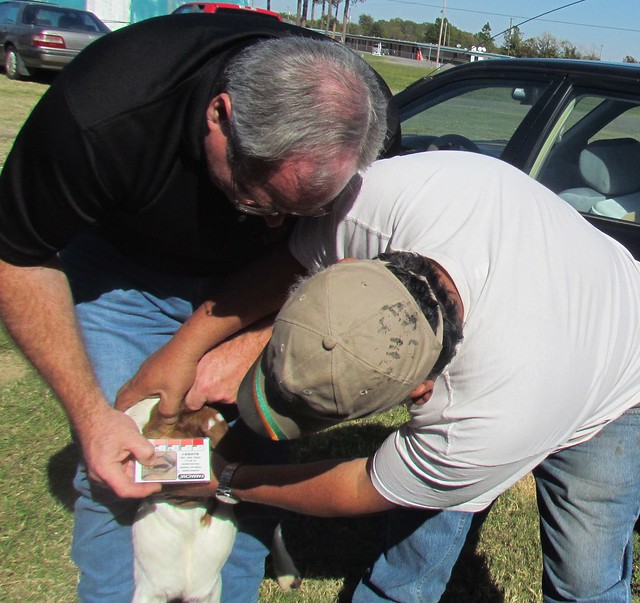Barber pole worms in sheep, goats a hazard after wet spring
By Carol Sanders
(480 words)
PINE BLUFF, Ark. – The warm, humid conditions this spring favored the survival of barber pole worms, the number one issue facing sheep and goat producers in the southeastern United States. A sheep or goat can die in a little over a month from blood loss to these worms, if not treated, said David Fernandez, Cooperative Extension Program livestock specialist at the University of Arkansas at Pine Bluff.
Barber pole worms are blood-sucking parasites that live in the true stomach of sheep, goats, llamas and alpacas. The worms can cause diarrhea, poor appetite, lethargy, anemia, bottle jaw and even death.
Barber pole worms have a very short life cycle that allows them to multiply rapidly. In as little as 35 days, eggs shed in the feces of animals can hatch, complete larval development, mate, begin sucking blood and laying the next generation of eggs.
“Barber pole worms can be controlled by chemical dewormers, but their overuse has reduced their efficacy,” Fernandez said. Good management techniques help prevent infection in the first place. Rotational grazing can reduce the number of parasites livestock consume, he said. Moving animals from one pasture to the next prevents the larvae from being eaten so the larvae eventually die.
Avoid overgrazing. Leave at least 3, preferably 4 inches of grass on your pastures when rotating to the next one. Don’t put hay or feed on the ground. Instead, use a feeder that makes animals eat with their heads up. Keep them from grazing or eating close to the ground so they will consume fewer parasites, advises Dr. Fernandez.
Ranchers cannot get rid of all the worms in their herds or flocks no matter how hard they try, said Dr. Fernandez. Resistance to dewomers is a natural occurrence so even with deworming, some parasites will always survive. That is why only animals needing deworming should be treated.
“Ranchers can determine which animals should be treated by using their FAMACHA score,” said Dr. Fernandez. “Keep track of the ones requiring repeated dewormings and cull them from the herd.”
Plants that are high in condensed tannins, such as sericea lespedeza, chicory, sainfoin and birdfoot trefoil can help control barber pole worms. Copper oxide wire boluses can help reduce infestations. Chemical dewormers still work, but check which ones work on your farm.
Resistance to dewormers must be addressed on a farm-by-farm basis. The Fecal Egg Count Reduction Test, or FECRT, can help identify which dewormers are still working on your farm.
“Perform your own fecal egg counts or have a veterinarian do it,” he said. You can learn how to conduct a fecal egg count and the FECRT by reading Extension fact sheet FSA9608, “Fecal Egg Counting for Sheep and Goat Producers” found online at http://www.uaex.uada.edu/publications/PDF/FSA-9608.pdf.
For more information on barber pole worms, FAMACHA scoring or other livestock-related problems, contact Dr. Fernandez at (870) 575-7214 or Fernandez@uapb.edu.
Pursuant to 7 CFR § 15.3, the University of Arkansas System Division of Agriculture offers all its Extension and Research programs and services (including employment) without regard to race, color, sex, national origin, religion, age, disability, marital or veteran status, genetic information, sexual preference, pregnancy or any other legally protected status, and is an equal opportunity institution.
# # #
Media Contact: Carol Sanders
School of Agriculture, Fisheries and Human Sciences
UAPB
(870) 575-7238
sandersc@uapb.edu
Related Links
